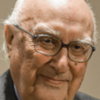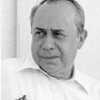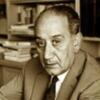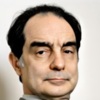Oriana Fallaci (1929–2006)
Author of A Man
About the Author
A prize-winning novelist and journalist, Oriana Fallaci is known primarily for her controversial interviews. She has spoken unabashedly, if not abrasively, with such world figures as Henry Kissinger, Willy Brandt, the Ayatollah Khomeini, Yasir Arafat, the Shah of Iran, Indira Ghandi, and Golda show more Meir. Her bold, often brilliant, interviewing technique is characterized by brutal frankness, as when she challenged Henry Kissinger to "talk about war." (Bowker Author Biography) show less
Works by Oriana Fallaci
La trilogia: La rabbia e l'orgoglio-La forza della ragione-Oriana Fallaci intervista sé stessa-L'apocalisse (2004) 14 copies
UN UOMO,O. FALLACI 3 copies
ইন্টারভিউ উইথ হিস্টরি 1 copy
Intervista con il potere 1 copy
Quel giorno sulla luna 1 copy
NJE BURRE 1 copy
L'Europeo. L aluna di Oriana 1 copy
Tarihle Söyleşiler 1 copy
La Rabbia e l'orgoglio 1 copy
Βιετνάμ 1 copy
La malfa 1 copy
Cinecittà a nudo 1 copy
Goftegoohāye Oriana Fallaci 1 copy
Sull'Antisemitismo (CD) 1 copy
Fallaci, Orianna Archive 1 copy
Tagged
Common Knowledge
- Canonical name
- Fallaci, Oriana
- Legal name
- Fallaci, Oriana
- Birthdate
- 1929-06-29
- Date of death
- 2006-09-15
- Burial location
- Cimitero degli Allori, Florence, Italy
- Gender
- female
- Nationality
- Italy
- Country (for map)
- Italy
- Birthplace
- Florence, Italy
- Place of death
- Florence, Italy
- Cause of death
- cancer
- Places of residence
- Florence, Italy
New York, New York, USA - Education
- University of Florence
- Occupations
- journalist
writer
war correspondent
resistance fighter (WW II)
novelist - Organizations
- L'Europeo
Epoca
Il Mattino dell'Italia centrale - Awards and honors
- St. Vincent Prize (Journalism)
Ambrogino d'oro (City of Milano)
Annie Taylor Award
Honorary Doctorate (Columbia College, Chicago) - Short biography
- The Encyclopedia of World Biography says: Italian journalist Oriana Fallaci became nearly as controversial as the world leaders and dissenting voices she was famous for interrogating during her long and prolific career. . . She often pushed her subjects into making controversial statements. . . In the preface to one of her most accomplished works, Interview with History, she summed up her antagonistic style of journalism, asserting, "I have always looked on disobedience toward the oppressive as the only way to use the miracle of having been born."
Members
Reviews
Sempre attuale.
"Vigliacco. Ipocrita. Vigliacco. Tu che le telefonavi soltanto perché lo buttasse via. Tu che per due mesi sei rimasto nascosto come un disertore. Tu che sei andato da lei solo perché ti ho pregato. Fate sempre così, vero? Vi spaventate e ci lasciate sole e al massimo tornate da noi in nome della paternità. Tanto che vi costa la paternità? Un ventre sfasciato da un ingrossamento ridicolo? La pena del parto, la tortura dell'allattamento? Il frutto della paternità vi viene show more scodellato dinanzi come una minestra già cotta, posato sul letto come una camicia stirata. Non avete che dargli un cognome se siete sposati, neanche quello se siete fuggiti. Ogni responsabilità è della donna, ogni sofferenza, ogni insulto. Puttana, le dite se ha fatto l'amore con voi. La parola puttano non esiste nel dizionario: usarla è un errore di glottologia. Sono millenni che ci imponete i vostri vocaboli, i vostri precetti, i vostri abusi. Sono millenni che usate il nostro corpo senza rimetterci nulla. Sono millenni che ci imponete il silenzio e ci relegate al compito di mamme. In qualsiasi donna cercate una mamma. A qualsiasi donna chiedete di farvi da mamma: perfino se è vostra figlia. Dite che non abbiamo i vostri muscoli e poi sfruttate la nostra fatica anche per farvi lucidare le scarpe. Dite che non abbiamo il vostro cervello e poi sfruttate la nostra intelligenza anche per farvi amministrare il salario. Eterni bambini, fino alla vecchiaia, restate bambini da imboccare, pulire, servire, consigliare, consolare, proteggere nelle vostre debolezze e nelle vostre pigrizie. Io vi disprezzo. E disprezzo me stessa per non saper fare a meno di voi, per non gridarvi più spesso: siamo stanche d'esservi mamme. Siamo stanche di questa parola che avete santificata per il vostro interesse, il vostro egoismo." show less
"Vigliacco. Ipocrita. Vigliacco. Tu che le telefonavi soltanto perché lo buttasse via. Tu che per due mesi sei rimasto nascosto come un disertore. Tu che sei andato da lei solo perché ti ho pregato. Fate sempre così, vero? Vi spaventate e ci lasciate sole e al massimo tornate da noi in nome della paternità. Tanto che vi costa la paternità? Un ventre sfasciato da un ingrossamento ridicolo? La pena del parto, la tortura dell'allattamento? Il frutto della paternità vi viene show more scodellato dinanzi come una minestra già cotta, posato sul letto come una camicia stirata. Non avete che dargli un cognome se siete sposati, neanche quello se siete fuggiti. Ogni responsabilità è della donna, ogni sofferenza, ogni insulto. Puttana, le dite se ha fatto l'amore con voi. La parola puttano non esiste nel dizionario: usarla è un errore di glottologia. Sono millenni che ci imponete i vostri vocaboli, i vostri precetti, i vostri abusi. Sono millenni che usate il nostro corpo senza rimetterci nulla. Sono millenni che ci imponete il silenzio e ci relegate al compito di mamme. In qualsiasi donna cercate una mamma. A qualsiasi donna chiedete di farvi da mamma: perfino se è vostra figlia. Dite che non abbiamo i vostri muscoli e poi sfruttate la nostra fatica anche per farvi lucidare le scarpe. Dite che non abbiamo il vostro cervello e poi sfruttate la nostra intelligenza anche per farvi amministrare il salario. Eterni bambini, fino alla vecchiaia, restate bambini da imboccare, pulire, servire, consigliare, consolare, proteggere nelle vostre debolezze e nelle vostre pigrizie. Io vi disprezzo. E disprezzo me stessa per non saper fare a meno di voi, per non gridarvi più spesso: siamo stanche d'esservi mamme. Siamo stanche di questa parola che avete santificata per il vostro interesse, il vostro egoismo." show less
Non avevo ancora conosciuto Oriana Fallaci, se non per i suoi ultimi strali contro l'islam. Che ovviamente non ho molto apprezzato. Ma quando ho letto i suoi libri ho trovato uno stile di scrittura eccezionale, duro, crudo eppure vero. Una donna forte ma con le sue debolezze. Il suo descrivere è oggettivo quando parla di fatti ma assolutamente riflettutto, commentato, "digerito" dalla sua personale lente interna. E mi è piaciuta. Mi è piaciuta soprattutto per il suo rifiutare qualsiasi show more etichetta, per il suo essere mentalmente indipendente da entrambi gli schieramenti, filoamericani e filocomunisti, in un'epoca in cui perfino i cantanti dovevano per forza essere schierati e se non lo erano gli si appiccicava un'adesivo di comodo. Non condivido tutto il modo di vedere della Fallaci, siamo profondamente diverse, ma ammiro in lei la grande scrittrice, la grande giornalista, la donna coraggiosa, la mente indipendente. E il riuscire a distinguere l'uomo oltre il marchio (bellissime le interviste con il generale Loan e tutte le interviste ai grandi che ha realizzato). Una denuncia della irragionevolezza della guerra, dal punto di vista dei "piccoli" che non decidono niente, nello stesso tempo descrizione del colonialismo violento americano e della feroce dittatura comunista, coi contadini costretti a rifornire di riso entrambi che poi facevano la fame. Un capolavoro. show less
Bellissimo. Perché è una storia d'amore, quello vero, straziante. Perché mi sono ritrovata da morire nelle riflessioni dell'autrice sul suo modo di amare, molto simili alle mie. Perché è un'opera che affonda nella storia recente. Perché è uno sguardo intelligente e onesto sulla politica di ieri, di oggi, di sempre. Tante parti di questo libro dovrebbero essere citate a memoria, per le profondità di concetto. E' soprattutto la storia di un uomo solo, che è tale perché non accetta di show more scendere a compromessi. Lo stile della Fallaci, pur essendo un po' verboso, scorre che è un piacere. Da leggere. show less
A heady and abrasive collection of interviews with some of the most prominent statesmen and women (and dictators) of the 1970s and early 80s, which is let down by some poor editing. Readers should also note that this book is not Interview with History. It contains some of the interviews from that earlier book, but I feel this needs to be clarified, as I was unsure myself before purchasing it. (For reference, the interviewees here are: Robert Kennedy, the Dalai Lama, Vo Nguyen Giap, Henry show more Kissinger, Golda Meir, Yasir Arafat, Muammar el-Qaddafi, Mohammed Riza Pahlavi (the Shah of Iran), Ayatollah Khomeini, Indira Gandhi, Zulfikar Ali Bhutto, Ariel Sharon, Lech Walesa and Deng Xiaoping.)
This is the sort of book where the phrase 'they don't make 'em like that anymore' goes through your head. They can't make 'em like that any more, to be honest; not with the slick, PR-coached play-it-safe model politicians use nowadays to snuff out any potential criticism. This affects both the calibre of politicians – I can't think of any today, with the exception of Donald Trump, who would speak with the candidness of any of the interviewees in this book – and journalists. For not only does this book provide a colourful mix of dictators, statesmen and ideologues, it also puts them into conflict with the legendarily pugnacious (or is it 'feisty' when it's a woman?) Italian interviewer Oriana Fallaci.
To get a sense of who Fallaci was, one only has to look to her two most (in)famous interviews: those with Henry Kissinger and the Ayatollah Khomeini. She managed to get the slippery Kissinger to jaw indulgently about himself and commit a number of gaffes: he later called it his worst ever interview with the press. And with the Ayatollah, who was at the time ruthlessly tightening the grip of Islamic fundamentalism on revolutionary Iran, Fallaci – in a heated exchange – tore off the black chador (similar to a burqa) that she had been forced to wear. Khomeini – in the holy city of Qom, at the heart of his power – stormed out. Fallaci refused to leave – hilariously, the male guards were scared to touch her to escort her out, lest contact with a woman put them afoul of the religious zealots – and managed to browbeat everyone involved for a second interview with the Ayatollah. Without her chador. Where she proceeded to challenge him on the very things that had caused him to storm out in the last interview. Yeah. They don't make 'em like that anymore. Sadly.
This Ayatollah interview is the highlight of the book – a surreal 90-page odyssey that reads like a dystopian Alice in Wonderland. Fallaci writes well – though she doesn't often get the chance to show it, as many of the interviews are mere transcripts – and she is able to have detailed, tough and sometimes witty sparring sessions with her interviewees. Some are better than others, of course (aside from the Ayatollah one, the Dalai Lama, Golda Meir, Gaddafi and Indira Gandhi ones are highlights), but all are bracingly heavyweight.
Unfortunately, Interviews with History and Conversations with Power is let down by some poor editing. At first, this was just a blizzard of typos – which is a poor show, but nothing unforgivable, even if they do continue throughout the whole book. But the reader's dissatisfaction is exacerbated by the lack of any introduction to the book that would put Fallaci's career into context, nor do many of the individual interviews do particularly well at providing introduction or context. (Have Google to hand if you want to know what the hell they are talking about sometimes.)
The dissatisfaction is complete when you realize the interviews are not chronological. This in itself would not be a problem if they were compiled in such a way as to enhance narrative flow, but they are not. The failure to make a virtue out of sequencing is most glaringly evident with regards to the Khomeini saga: introducing a November 1972 interview with Golda Meir, Fallaci says that Gaddafi has never granted her an interview. A couple of chapters later, we get a 1979 interview with Gaddafi. (Clearly, the book has ripped the Golda Meir interview from Interview with History without remedying this small detail.) In this Gaddafi interview, a Libyan fixer makes reference to the infamous chador incident with Khomeini. Putting this interview before Khomeini's – just two chapters later, also set in 1979 – seems a mistake. To capstone this blunder, the Khomeini interview ends with a challenge to Gaddafi to allow her to interview him, which would have been a nice segue into the Gaddafi interview had we not already read it two chapters earlier. Clearly, not much thought has gone into the sequencing of this book.
It is an engrossing read; Fallaci and some of the people she interviews are fascinating. (And some are beneath contempt.) It is just a shame that, with the typos and the poor editorial decisions, some of the power of this powerful woman is lost. show less
This is the sort of book where the phrase 'they don't make 'em like that anymore' goes through your head. They can't make 'em like that any more, to be honest; not with the slick, PR-coached play-it-safe model politicians use nowadays to snuff out any potential criticism. This affects both the calibre of politicians – I can't think of any today, with the exception of Donald Trump, who would speak with the candidness of any of the interviewees in this book – and journalists. For not only does this book provide a colourful mix of dictators, statesmen and ideologues, it also puts them into conflict with the legendarily pugnacious (or is it 'feisty' when it's a woman?) Italian interviewer Oriana Fallaci.
To get a sense of who Fallaci was, one only has to look to her two most (in)famous interviews: those with Henry Kissinger and the Ayatollah Khomeini. She managed to get the slippery Kissinger to jaw indulgently about himself and commit a number of gaffes: he later called it his worst ever interview with the press. And with the Ayatollah, who was at the time ruthlessly tightening the grip of Islamic fundamentalism on revolutionary Iran, Fallaci – in a heated exchange – tore off the black chador (similar to a burqa) that she had been forced to wear. Khomeini – in the holy city of Qom, at the heart of his power – stormed out. Fallaci refused to leave – hilariously, the male guards were scared to touch her to escort her out, lest contact with a woman put them afoul of the religious zealots – and managed to browbeat everyone involved for a second interview with the Ayatollah. Without her chador. Where she proceeded to challenge him on the very things that had caused him to storm out in the last interview. Yeah. They don't make 'em like that anymore. Sadly.
This Ayatollah interview is the highlight of the book – a surreal 90-page odyssey that reads like a dystopian Alice in Wonderland. Fallaci writes well – though she doesn't often get the chance to show it, as many of the interviews are mere transcripts – and she is able to have detailed, tough and sometimes witty sparring sessions with her interviewees. Some are better than others, of course (aside from the Ayatollah one, the Dalai Lama, Golda Meir, Gaddafi and Indira Gandhi ones are highlights), but all are bracingly heavyweight.
Unfortunately, Interviews with History and Conversations with Power is let down by some poor editing. At first, this was just a blizzard of typos – which is a poor show, but nothing unforgivable, even if they do continue throughout the whole book. But the reader's dissatisfaction is exacerbated by the lack of any introduction to the book that would put Fallaci's career into context, nor do many of the individual interviews do particularly well at providing introduction or context. (Have Google to hand if you want to know what the hell they are talking about sometimes.)
The dissatisfaction is complete when you realize the interviews are not chronological. This in itself would not be a problem if they were compiled in such a way as to enhance narrative flow, but they are not. The failure to make a virtue out of sequencing is most glaringly evident with regards to the Khomeini saga: introducing a November 1972 interview with Golda Meir, Fallaci says that Gaddafi has never granted her an interview. A couple of chapters later, we get a 1979 interview with Gaddafi. (Clearly, the book has ripped the Golda Meir interview from Interview with History without remedying this small detail.) In this Gaddafi interview, a Libyan fixer makes reference to the infamous chador incident with Khomeini. Putting this interview before Khomeini's – just two chapters later, also set in 1979 – seems a mistake. To capstone this blunder, the Khomeini interview ends with a challenge to Gaddafi to allow her to interview him, which would have been a nice segue into the Gaddafi interview had we not already read it two chapters earlier. Clearly, not much thought has gone into the sequencing of this book.
It is an engrossing read; Fallaci and some of the people she interviews are fascinating. (And some are beneath contempt.) It is just a shame that, with the typos and the poor editorial decisions, some of the power of this powerful woman is lost. show less
Lists
Awards
You May Also Like
Associated Authors
Statistics
- Works
- 68
- Members
- 4,619
- Popularity
- #5,452
- Rating
- 3.9
- Reviews
- 105
- ISBNs
- 297
- Languages
- 20
- Favorited
- 11
Charts & Graphs
Loading




















